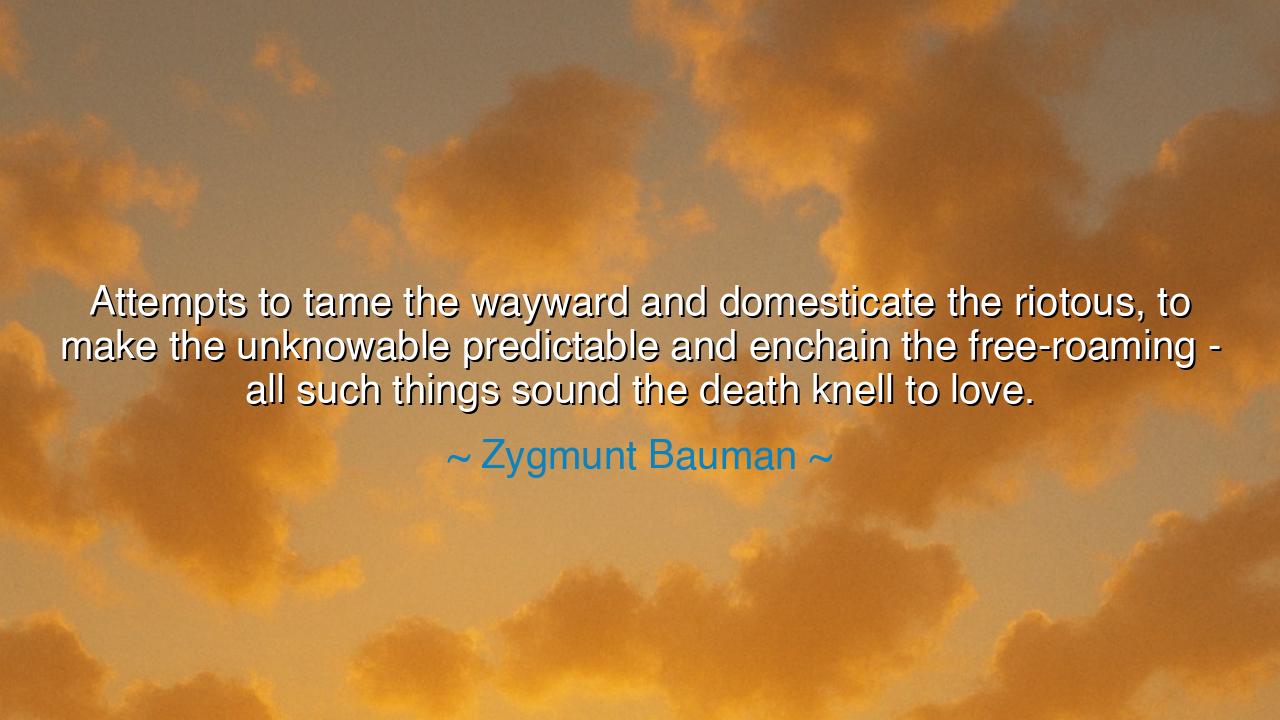
Attempts to tame the wayward and domesticate the riotous, to make
Attempts to tame the wayward and domesticate the riotous, to make the unknowable predictable and enchain the free-roaming - all such things sound the death knell to love.






The philosopher Zygmunt Bauman once said, “Attempts to tame the wayward and domesticate the riotous, to make the unknowable predictable and enchain the free-roaming — all such things sound the death knell to love.” In these words lies a profound truth — that love, like the wind, cannot be bound; it must move freely, or it ceases to live. Bauman, whose thoughts often wandered through the complexities of human relationships in our “liquid modern” world, speaks here not only of romance, but of the very nature of the human heart. For what is love, if not the most untamed of all forces — unpredictable, wild, and divine in its uncertainty?
The ancients knew that to love is to surrender the illusion of control. Eros, the Greek god of love, was depicted not as a serene figure, but as a mischievous child, armed with arrows that pierce without warning. His nature was riotous, his effects unpredictable. Even the gods trembled before his power, for love could turn the wise into fools and the mighty into servants. To tame such a force, to demand that it conform to reason and order, is to drain it of its fire — to turn it into a shadow of itself. This is the essence of Bauman’s warning: that when we try to make love safe, we strip it of the very freedom that gives it life.
Consider the tragic story of Shah Jahan and Mumtaz Mahal. Their love burned bright, defying empire and time. Yet when Mumtaz died, the emperor sought to preserve her forever — to capture her beauty and their passion in stone. Thus, he built the Taj Mahal, a wonder of the world, a monument to eternal love. And yet, within that monument lies also a paradox: love, once made still, becomes memory; the living flame turned to marble. In trying to preserve love, we risk entombing it. Bauman’s wisdom whispers through this tale — that love must breathe, must change, must roam, or it perishes beneath the weight of our possessiveness.
The desire to control love comes from fear — the fear of loss, of betrayal, of impermanence. But the wise know that all beautiful things are fleeting. The cherry blossom, the sunset, the laughter of youth — their wonder lies precisely in their transience. So too with love: its power is in its freedom, its capacity to grow, to evolve, to surprise. When one lover seeks to bind the other, love withers into obligation; when one heart demands certainty, affection cools into habit. Love cannot be enslaved; it must be trusted, even when it cannot be fully understood.
In this, Bauman also speaks to the condition of the modern world. We seek to measure, define, and categorize everything — even the mysteries of the soul. We demand guarantees where only faith can exist. But the ancients taught otherwise: Lao Tzu said that the Tao that can be named is not the eternal Tao. Likewise, the love that can be explained, managed, or secured is not the eternal love. To live in love is to dwell in wonder, to accept both the joy and the risk that come with it. In trying to make it predictable, we turn a living flame into cold ash.
The lesson, then, is clear: if you would keep love alive, set it free. Let your beloved be their own — not a possession, but a presence. Do not demand that they fulfill your every need or mirror your every thought. Love them as the wind loves the leaves — by moving through them, not holding them still. The greatest love stories are not those of control, but of trust, where two souls walk beside each other, bound not by chains but by choice.
So, my child of tomorrow, remember this ancient truth: love thrives not in captivity, but in freedom. When you love, do not clutch it tightly as if it were a fragile object, for it will crumble in your hands. Hold it lightly, tenderly, as one holds light itself — a warmth that can be shared but never possessed. For as Bauman teaches, to tame what is wild is to kill what is beautiful. And the greatest act of love is not to conquer the heart of another, but to let it beat freely beside your own, in rhythm with the great song of life.






AAdministratorAdministrator
Welcome, honored guests. Please leave a comment, we will respond soon